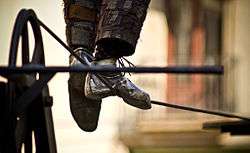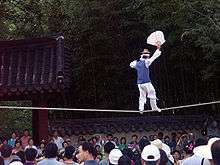Tightrope walking

Tightrope walking, also called funambulism, is the skill of walking along a thin wire or rope. It has a long tradition in various countries and is commonly associated with the circus. Other skills similar to tightrope walking include slack rope walking and slacklining.
Types of rope and wire walking
- Tightwire is the skill of maintaining balance while walking along a tensioned wire between two points. It can be done either using a balancing tool (umbrella, fan, balance pole, etc.) or "freehand", using only one's body to maintain balance. Typically, tightwire performances either include dance or object manipulation. Object manipulation acts include a variety of props in their acts, such as clubs or rings, hats or canes. Tightwire performers have even used wheelbarrows with passengers, ladders, and animals in their act. The technique to maintain balance is to keep the performer's centre of mass above their support point - usually their feet.
- Highwire is a form of tight wire walking but performed at much greater height. Although there is no official height when tight wire becomes high wire, generally a wire over 20 feet (6 m) high will be regarded as a high wire act.
- Skywalk is a form of highwire which is performed at great heights and length. A skywalk is performed outdoors between tall building, gorges, across waterfalls or other natural and man-made structures.
- Highwire is a form of tight wire walking but performed at much greater height. Although there is no official height when tight wire becomes high wire, generally a wire over 20 feet (6 m) high will be regarded as a high wire act.

- Slackwire or slackrope is a type of wire or rope walking where the support is flexible or 'slack'. The tension on the wire or rope is mainly provided by the weight of the performer and their props. The difference in technique required to maintain balance on a slackwire is that the performer moves the wire under his centre of mass. The flexibility of the wire or rope allows the performer to achieve this.
- Slacklining is a popular form of slackwire walking which utilizes nylon webbing stretched tight between two anchor points. Slacklining is distinct from tightrope walking in that the line is not held rigidly taut; it is instead dynamic, stretching and bouncing like a long and narrow trampoline. The tension of the slackline can be varied to allow for a variety of balance skills to be performed. The tighter a slackline the closer the technique and performance is to tightwire; the more slack in the slackline, the more similar it is to slack rope walking and performance.
Biomechanics
Acrobats maintain their balance by positioning their centre of mass directly over their base of support, i.e. shifting most of their weight over their legs, arms or whatever part of their body they are using to hold them up. When they are on the ground with their feet side by side, the base of support is wide in the lateral direction but narrow in the sagittal (back-to-front) direction. In the case of highwire-walkers, their feet are parallel with each other, one foot positioned in front of the other while on the wire. Therefore, a tightwire walker's sway is side to side, their lateral support having been drastically reduced. In both cases, whether side by side or parallel, the ankle is the pivot point.
A wire-walker may use a pole for balance or may stretch out his arms perpendicular to his trunk in the manner of a pole. This technique provides several advantages. It distributes mass away from the pivot point, thereby increasing the moment of inertia. This reduces angular acceleration because a greater force is required to rotate the performer over the wire. The result is less tipping. In addition the performer can also correct sway by rotating the pole. This will create an equal and opposite torque on the body.
Tightwire-walkers typically perform in very thin and flexible, leather-soled slippers with a full length suede or leather sole to protect the feet from abrasions and bruises while still allowing the foot to curve around the wire. Though very infrequent in performance, amateur, hobbyist, or inexperienced funambulists will often walk barefoot so that the wire can be grasped between the big and second toe. This is more often done when using a rope, as the softer and silkier fibres are less taxing on the bare foot than the harder and more abrasive braided wire.
Famous tightrope artists


- Jorge Ojeda-Guzman, Ecuadorian highwire walker, set The Guinness Book of World Records, Tightrope Endurance Record, for living 205 days on the wire, from January 1 to July 25, 1993 in Orlando, Florida.
- Charles Blondin, a.k.a. Jean-François Gravelet, crossed the Niagara Falls many times
- Robert Cadman, early 18th-century British highwire walker and ropeslider
- Con Colleano, Australian, "the Wizard of the Wire"
- David Dimitri, Swiss highwire walker
- Pablo Fanque, 19th-century British tightrope walker and "rope dancer", among other talents, although best known as the first black circus owner in Britain, and for his mention in the Beatles song, Being for the Benefit of Mr. Kite!
- The Great Farini, a.k.a. Willie Hunt, crossed the Niagara Falls many times
- Farrell Hettig, American highwire walker, started as a Wallenda team member, once held record for steepest incline for a wire walk he completed in 1981[1]
- Adili Wuxor, Chinese (Uyghur), from Xinjiang, performer of the Uyghur tradition of highwire-walking called dawaz; record-holder for highest wire-walk, in 2010 he set a Guinness Book world record by living on wire for 60 days, at Beijing's Bird Nest Stadium [2]
- Jade Kindar-Martin and Didier Pasquette, an American-French highwire duo, most notable for their world-record setting skywalk over the River Thames in London
- Henri L'Estrange, 19th century Australian; first person to tightrope walk across Sydney harbour and early balloonist
- Elvira Madigan, Danish 19th-century tightwire walker
- Bird Millman, American star of Ringling Brothers & Barnum and Bailey Circus
- Rudy Omankowski, Jr., French-Czech highwire walker, holds record for skywalk distance
- Stephen Peer, after several previous successful crossings, fell to his death at the Niagara Falls in 1887
- Philippe Petit French highwire-walker, famous for his walk between the towers of the World Trade Center in New York City in 1974
- Eskil Rønningsbakken, Norwegian balancing artist whose feats include tightrope walking between hot air balloons in flight
- Maria Spelterini, Italian highwire walker, first woman to cross the Niagara Falls
- Falko Traber, German tightwire walker, walked to the Sugarloaf Mountain in Rio de Janeiro
- The Flying Wallendas, famous for their seven- and eight-person pyramid wire-walks
- Karl Wallenda, founder of the Flying Wallendas, died after falling from a wire on March 22, 1978 at age 73 while attempting to cross between the two towers of the Condado Plaza Hotel in San Juan, Puerto Rico.
- Nik Wallenda, great-grandson of Karl, second person to walk from the United States to Canada over the Horseshoe Falls at the Niagara Falls on June 15, 2012; with his mother Delilah (Karl's granddaughter), completed his great-grandfather's final attempt between the two towers of the Condado Plaza Hotelon June 4, 2011. On June 23, 2013 he successfully walked over a gorge in the area of the Grand Canyon. On November 2, 2014, he crossed over the Chicago River from the west tower of Marina City to the Leo Burnett building, following it with a blindfolded trip from the west tower to the east tower of Marina City.[3][4]
- Rick Wallenda, American highwire walker, performed a record-breaking skywalk of 2,000 feet (610 m) at Kings Island on July 4, 2008, breaking Karl Wallenda's record walk[5][6]
- Denis Josselin, a French tightrope walker, completed on 6 April 2014 a walk over the river Seine in Paris. It took him 30 minutes to walk over 150 m (490 feet) of rope, 25 m (82 feet) meters above the river. He covered his eyes halfway through without harness or safety net but police boats were on hand in case he fell.[7][8]
- Jay Cochrane, Canadian, set multiple records for skywalking, including The Great China Skywalk[9] in Qutang Gorge, China, 639-metre-long (2,098 ft), 410-metre-high (1,340 ft) from one cliff wall to the opposite side above the Yangtze River; the longest and highest blindfolded skywalk, 800-foot-long (240 m), 300-foot-high (91 m) in 1998, between the towers of the Flamingo Hilton in Las Vegas, Nevada, and broadcast on FOX Network's "Guinness World Records: Primetime" on Tuesday, February 23, 1999; In 2001, he became the first person to perform a skywalk in Niagara Falls, Canada, in more than a hundred years. His final performances took place during Skywalk 2012[10] with a world record submission[11] of 11.81 miles (19.01 km) in cumulative distance skywalking from the Skylon Tower at a height of 520 feet (160 m) traversing the 1,300 feet (400 m) highwire to the pinnacle of the Hilton Fallsview Hotel at 581 feet (177 m).
Metaphorical use
The word funambulism or the phrase "walking a tightrope" is also used in a metaphorical setting not referring to any actual acrobatic acts. For instance, politicians are said to "walk a tightrope" when trying to balance two opposing views with little room for compromise. The term can also be used in satirical or acidic contexts. Nicholas Taleb uses the phrase in his book The Black Swan. "You get respect for doing funambulism or spectator sports". Taleb is criticising scientists who prefer popularism to vigorous research and those who walk a fixed and narrow path rather than explore a large field of empirical study.[12]
See also
References
- ↑ Mark Zaloudek (August 27, 2006). "Farrell Hettig found success on high wire and in business". Sarasota Herald-Tribune. Retrieved June 16, 2012.
- ↑ Tightrope Walking, A Uyghur Tradition Radio Free Asia, retrieved December 13th, 2010.
- ↑ "Live blog: Nik Wallenda's Chicago skyscraper walks". www.chicagotribune.com. November 2, 2014. Retrieved November 2, 2014.
- ↑ "Daredevil Wallenda successfully completes 2 Chicago skyscraper tightrope walks". foxnews.com. November 2, 2014. Retrieved November 2, 2014.
- ↑ "Wallenda Enterprises Inc. - Exceeding The Limits of Tradition". Retrieved July 30, 2008.
- ↑ Rossiter, Marie. "Tight-rope walker breaks record at Kings Island". Dayton Daily News. Retrieved July 7, 2008.
- ↑ http://globalnews.ca/news/1253633/tightrope-walker-denis-josselin-completes-walk-over-the-river-seine-in-paris/
- ↑ http://www.theguardian.com/world/video/2014/apr/07/paris-tightrope-walker-crosses-river-seine-video
- ↑ (You Want To Go Where? by Jeff Blumenfeld)
- ↑ [http://www.niagarafallsreview.ca/2012/09/25/cochrane-raises-10k-for-charity
- ↑
- ↑ Taleb, Nicholas. Black Swan. 2010 UK. p.368
